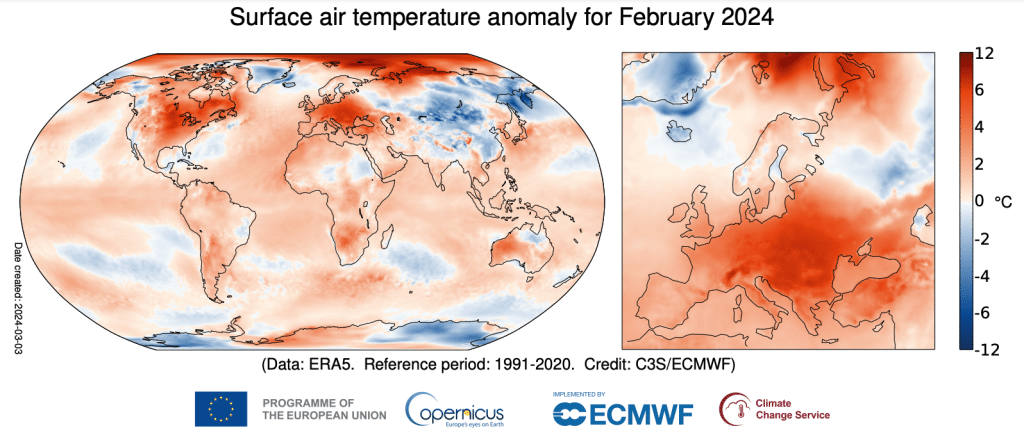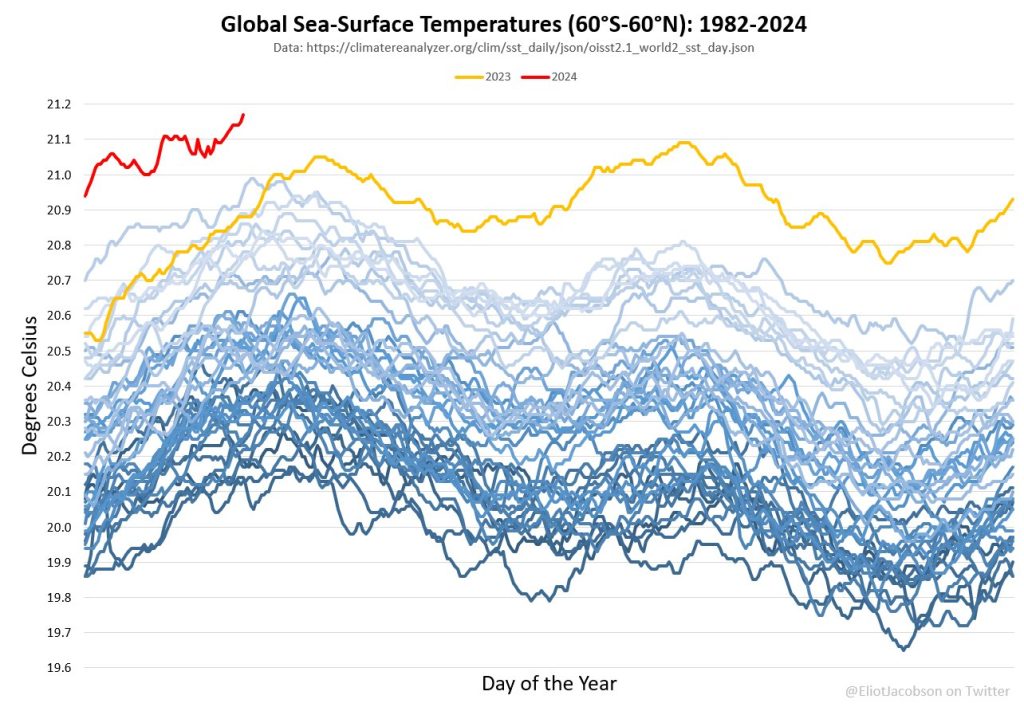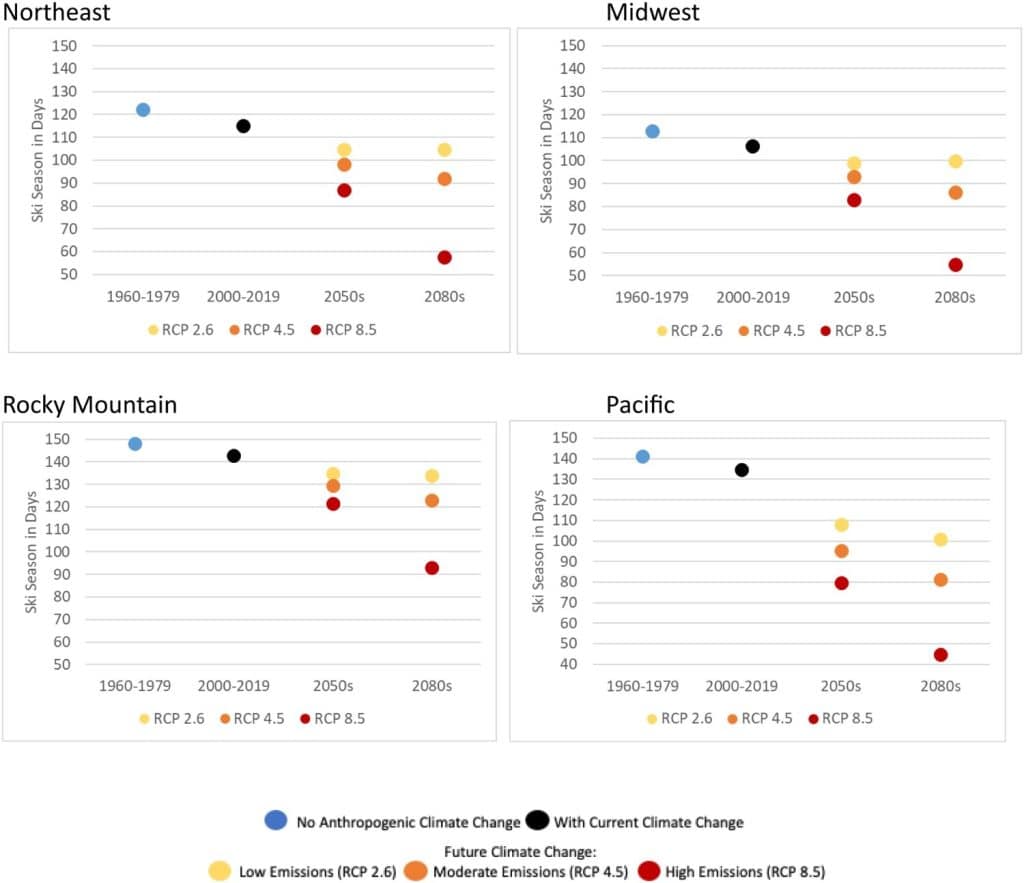This weekly round-up brings you key climate news from the past seven days, including new EU-wide packaging rules and signs that a potential fourth mass coral bleaching event could soon unfold.
—
1. World Temperatures Break Record for Ninth Month Straight in February, EU’s Climate Service Says
With an average temperature of 13.54C, February 2024 was the hottest February ever recorded globally, breaking the previous record set in 2016 by 0.12C, the Copernicus Climate Change Service (C3S) has announced.
With temperatures at 1.77C above an estimate of the February average for 1850-1900, last month also marked the ninth consecutive time that recorded temperatures for a particular month have reached unprecedented levels.
Most regions around the world, including northern Siberia, central and northwest North America, most of South America, Africa, and western Australia, saw above-average temperatures, though Europe bore the most brunt, with temperatures in February at 3.30C above the 1991-2020 average for that month, the European Union’s Earth Observation program said in a press release on Tuesday.

Sea temperatures also remained at an “unusually high level,” continuing a long trend of “persistently and unusually high” sea temperatures since May of last year.
Read more here.
2. EU Strikes Deal to Reduce Packaging Waste and Ban Single-Use Plastics
The European Parliament’s representatives and Belgium, which currently holds the Council’s presidency, reached a deal on Monday aimed at tackling the increase in packaging waste generated in the European Union.
The provisional agreement, pending adoption by both institutions, effectively strengthens existing bloc-wide sustainability and recycling requirements and covers the full life cycle of packaging in a bid to tackle the EU’s mounting piles of packaging waste driven by online shopping and the rise of takeaway culture.
In order to achieve the packaging reduction targets of 5% by 2030 and 15% by 2040 agreed upon on Monday, the new legislation addresses single-use plastics and introduces new requirements to promote reutilisation and recycling of packaging.
Read more here.
3. Record Ocean Temperatures Push Coral Reefs to Brink of Fourth Mass Bleaching Event
As the global sea surface temperature set a new record high on Monday at 21.17C following months of above-average temperatures, scientists are raising the alarm about a potential fourth mass coral bleaching event.
Speaking with Reuters, the coordinator of the US National Oceanic and Atmospheric Administration’s (NOAA) Coral Reef Watch Derek Manzello said it was likely that the entire Southern Hemisphere would experience bleaching this year.

According to the World Meteorological Organization (WMO), sea surface temperatures have been “persistently and unusually high” since May of last year. While this was partly due to the return of El Niño last year, heat-trapping greenhouse gases remain “unequivocally the main culprit,” as oceans absorb more than 90% of the extra heat in the planet’s climate system that results from human-made global warming.
Read more here.
4. US Ski Industry At Risk of Collapsing As Global Warming Accelerates
Anthropogenic disruptions in the global climate system in recent years have significantly damaged the US ski industry, resulting in billions of dollars in economic losses, a new study has found.
Mountainous regions have been disproportionately affected by global warming, impacting snow cover and shortening the winter season. A recent assessment of human influence on Northern Hemisphere snow loss found a significant correlation between anthropogenic climate change and snow cover decline over the 1981-2020 period.

According to the new study, which assessed more than 220 ski areas across four US regional ski markets, the average US ski season has shortened between 5.5 and 7.1 days in the 2000-2019 period, compared to 1960-1979, and it is expected to further shorten anywhere between 14-33 days and 27-62 days by 2050 in a low and high emissions scenario, respectively. This resulted in huge economic losses for the country’s ski industry, amounting to an average of $252 million a year and exceeding $5 billion over the past two decades.
Read more here.
5. Drought-Driven Shortfall in Hydropower Generation Partly to Blame for Record-High Global CO2 Emissions in 2023, IEA Says
Global carbon dioxide (CO2) emissions grew by 410 million tonnes – or 1.1% – in 2023, reaching a historic high of 37.4 billion tonnes, with emissions from coal accounting for more than 65% of the increase, according to a new analysis.
The largest increase globally took place in China, the International Energy Agency (IEA) said in its latest report, with per capita emissions in the country now 15% higher than in other advanced economies, owing to a post-pandemic rebound in coal and oil demand that was further exacerbated by recent extreme weather events including historic droughts. But droughts did not affect just China. According to the IEA analysis published Friday, a global shortfall in hydroelectric power generation due to droughts drove up emissions from fossil fuels by an additional 170 million tonnes. Without it, the Agency said, global emissions would have likely declined last year.
Read more here.

















